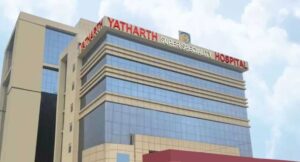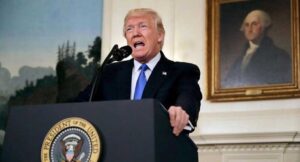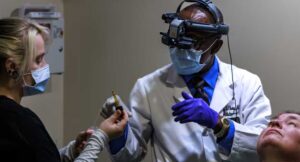American doctors are accusing US health insurance giants of causing deadly delays to vital medical procedures and care – and putting profits ahead of their patients’ health.
Firms including United Healthcare have denied basic scans, and taken months to reconsider, according to physicians who spoke to the Guardian.
“There’s good evidence that these kinds of delays literally kill people,” said Dr Ed Weisbart, former chief medical officer for Express Scripts, one of the largest prescription benefits managers in the US. “For some people, this isn’t just an inconvenience and an annoyance and an aggravation.
“It’s a death sentence, and the only reason the insurance companies do that is to maximize their profits. The fact that they might be killing you is not in the equation of what they care about.”
Americans spend the most on healthcare in the industrialized world – an estimated $4.9tn in 2023 – but have the worst health outcomes, according to analysis by the Commonwealth Fund.
The fatal shooting of UnitedHealthcare CEO Brian Thompson last month prompted an outpouring of public anger toward the healthcare industry. While private insurers report billions in profits every year, many patients – and their doctors – struggle to navigate a complex financial system to get what they need.
Lobbyists for the insurance firms insist they are “working to protect” people from higher costs, and stress that everyone in the space, including doctors, are responsible for making the US healthcare system care more affordable and easier to navigate.
But in a series of interviews, medical professionals described their frustration with a powerful industry which had prevented them from helping patients.
‘We’re stuck in this terrible, vicious circle’
Dr Cheryl Kunis, a board member at the Physicians for a National Health Program and nephrologist in New York City, still thinks about what happened when one of her patients needed a PET scan. He had a tumor, and before deciding on how to treat it, Kunis and her colleagues wanted to establish if it had spread.
“The surgeon was very honest that he only wanted to operate if the tumor was localized, and without the PET scan, he really would not be able to make that decision,” said Kunis. “The surgeon and his office, as well as my office, spent hours on the phone. We were speaking to somebody who was sitting at UnitedHealthcare in front of a computer screen who was really not knowledgeable on the underlying medical problem or the test that we are asking for the patient to have.”
After an initial denial, the patient’s appeal for the scan was ultimately approved six months later. By that the time, the patient had died.
“We assume that if he had been diagnosed earlier, he may have been able to do better,” said Kunis. “There’s no way of proving it, but there was a reasonable chance he would have been in better shape had there not been a six-month delay in getting the scan.”
The healthcare system is “just really stuck in this terrible, vicious circle”, she said, “of prices constantly going up, lack of regulation and the insurance companies unfortunately having leverage over the patients who are trying to receive the care”.
‘It’s both demoralizing and insulting’
Health insurance companies often require “peer to peer” reviews, where doctors are required to speak with a medical representative from a health insurance company to justify treatment. But the insurance representatives are often far less experienced, according to physicians who spoke to The Guardian, and may not even have training in the specific field they are weighing in on.
“When I have engaged in ‘peer to peer’ review, the peer is never a physician that has my training,” said Dr Philip Verhoef, an Intensive Care Unit physician based in Honolulu, Hawaii, and former president of Physicians for a National Health Program. “It’s kind of a farce to even call it ‘peer to peer’. I’ve never had a ‘peer to peer’ conversation that was actually with a real peer.”
Instead, the representatives are “second-guessing our judgment as clinicians”, he claimed. “To be totally clear, I don’t have a financial incentive to admit patients to the ICU. It’s both demoralizing and insulting when a bureaucrat somewhere looks at a submitted claim from the hospital and says, ‘The decision to admit to the ICU was wrong.’”
Verhoef said he often sees patients coming into the intensive care unit for preventable illnesses caused by health insurance company denials, such as refusing to cover required medication, like insulin, or an inhaler for asthma.
“When people need to use their private health insurance, it actually fails them,” he added. “Insurance is supposed to be there to cover you from financial calamity, when unfortunate things happen, and the current system that we have based on private health insurance has really failed everyone. I don’t think that we’re going to regulate our way out of this mess.”
Much of the friction patients encounter when seeking medical care or assistance is fundamental to the insurance firms’ business models, according to Weisbart. “They don’t care about you, and they see you as an expense, not someone whose health needs to be improved,” he said. “The healthier you are, the more they want you to have them as their insurance, and the sicker you are, the more comfortable they are with you being dissatisfied with them and searching for a different insurance company.
“Once they have that money, every time somebody has to get health care, that’s just an expense that they don’t want to let go of.”
The insurance industry’s profits revolve around delaying and denying medical care, Weisbart claimed. “When they delay your care by a day, by a week, by a month or totally deny it, it’s not a random event,” he said. “It’s a calculated business strategy to maximize their profits.”
‘Problem getting much worse’
Many doctors have recently expressed similar issues with private insurers. Physicians are “forced to become insurance experts on top of our medical expertise, spending countless hours on paperwork instead of patient care,” Dr Bayo Curry-Winchell of Nevada wrote in an article for Katie Couric Media, while Dr Claudia Fagan, chief medical officer of Cook County Health, wrote in an article for Common Dreams that she had “seen patients suffer and die in order to pad the bottom lines of corporate health insurers – and in recent years I have seen this problem getting much worse”.
UnitedHealthcare did not respond to multiple requests for comment. AHIP, a lobby group for the industry, said in an emailed statement: “In the fragmented and heavily regulated healthcare system, health plans, providers and drugmakers share a responsibility to make high-quality care as affordable as possible and easier to navigate for the people we collectively serve. Health plans are working to protect patients from the full impact of rising costs while connecting them to care that is safe, evidence-based and coordinated.”
Doctors who spoke to the Guardian suggested fixing problems with the US healthcare system will require more than tinkering at the edges.
Both Weisbart and Verhoef argued the solution would require moving away from private health insurance, toward a single payer healthcare system, similar to other wealthy countries that provide healthcare to all.
“The solution is effectively to overhaul the system entirely and then start from scratch with the national health insurance system,” said Verhoef. “Solutions that depend on trying to regulate the private insurance industry are simply going to fail.”
There is “no way to modestly reform a fundamental flaw in a business model”, added Weisbart. “Their business model is designed on delaying, denying and redirecting healthcare We know a much better way: the much better way is to build a system on the traditional Medicare program. Fix the things that are wrong with Medicare … and then simply provide that to everybody.”
Moving to a single-payer, universal healthcare system would likely cost less than current national healthcare expenditure, according to a 2020 academic analysis – and save tens of thousands of lives each year. The Guardian









